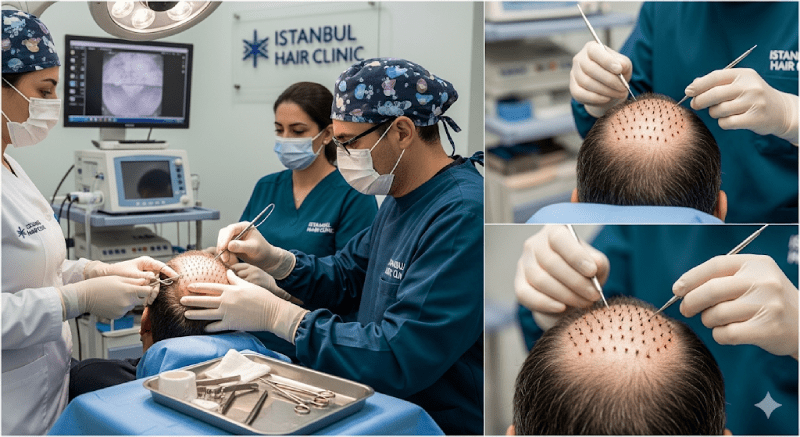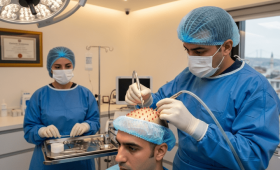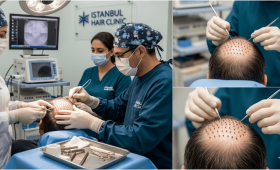What is the Cost of a 7000 Grafts Hair Transplant Operation in Turkey?
The cost of a 7000-graft hair transplant operation in Turkey varies depending on many factors. Operations with such a high number of grafts are usually planned for patients with large bald areas or those who want full density. Prices vary according to the quality of the clinic, the surgeon’s experience, the technology used, and whether the operation will be performed in a single session or two sessions. On average, considering all-inclusive packages, prices can range between €3,500 and €7,000. These prices are quite competitive compared to Western countries.
Is a 7000-Graft Transplant Really Necessary?
A 7000-graft hair transplant operation may be necessary in cases of very advanced hair loss or for patients with a very large bald area. This number of grafts is usually considered for people with stage 6 and 7 baldness according to the Norwood scale. With such a high number of grafts, both the hairline can be recreated and the bald spots on the crown and back can be covered with a dense appearance. However, to achieve this number, the patient’s donor area must be sufficient and healthy. Your surgeon will determine how many grafts are needed with a detailed analysis.
Is Harvesting So Many Grafts Risky?
Harvesting as many as 7000 grafts can be risky in inexperienced hands. One of the most important risks is permanent thinning and weakening of the hair in the donor area due to over-harvesting. Additionally, the risks of infection and tissue damage can also increase during such a long operation. However, when this procedure is performed by an experienced surgeon with modern equipment that meets international standards, the risks are greatly reduced. The correct evaluation and protection of the donor area is the most critical step in this process.
Can 7000 Grafts Be Transplanted in a Single Session?
A 7000-graft hair transplant can technically be performed in a single session, but this is often not recommended. Transplanting such a high number of grafts in one session can cause the operation to last up to 10-12 hours, making it an exhausting process for both the patient and the surgical team. It is generally recommended to spread the operation over two days for a better result and a more comfortable recovery process. This both reduces the stress on the donor area and increases the survival rate of the transplanted grafts.
Who is a Suitable Candidate for a 7000-Graft Transplant?
The most suitable candidate for a 7000-graft hair transplant operation is primarily someone who is in good general health, has no contagious diseases, and, most importantly, has a sufficient and healthy donor area. The density and quality of the genetically resistant hair follicles are of critical importance for the successful harvesting of such a high number of grafts. Your surgeon will perform a detailed evaluation by analyzing your hair to determine if this number of grafts is suitable for you.
What Are the Most Important Factors Affecting the Price?
The most important factors affecting the price include the location and quality of the clinic or hospital, the surgeon’s experience and reputation in this field, the hair transplant technique to be used (for example, the DHI technique is more expensive than FUE), the package content (additional services like accommodation, transfers, medications), and whether the operation will be done in a single session or multiple sessions. These factors in Turkey ensure that prices are more affordable compared to Western countries.
Why Do Hair Transplant Prices Vary So Much?
The main reasons for the wide variety of hair transplant prices in Turkey include intense competition among clinics, different service quality standards, and the experience levels of the surgeons performing the operation. Some clinics offer all-inclusive luxury packages, while others only offer the operation service. The modernity of the technological equipment used and the location of the clinic can also cause price differences. When comparing prices, it is important to focus not only on the number but also on the scope of the services offered.
What is the Difference Between FUE and DHI Techniques?
FUE (Follicular Unit Extraction) and DHI (Direct Hair Implantation) are the most commonly used hair transplant techniques. In the FUE technique, hair follicles are harvested one by one and transplanted into pre-made incisions. This method is ideal for large areas and is more economical. In the DHI technique, hair follicles are harvested using a special Choi pen and transplanted simultaneously. This method requires a more delicate procedure, is less invasive as it bypasses the incision-making stage, and can provide a denser transplant, which is why it is generally more costly.

What is Included in the Package Prices?
Hair transplant clinics in Turkey usually offer “all-inclusive” packages for international patients. These packages include the operation itself, necessary pre- and post-operative tests, anesthesia, materials used during the operation, post-operative medications, shampoo and lotions, airport transfers, and accommodation services. These comprehensive services facilitate the travel and treatment process for patients and prevent them from encountering unexpected costs.
How Long Does the Hair Transplant Operation Take?
A 7000-graft hair transplant operation can take up to 8-12 hours, as the number of grafts is high. The operation consists of three main stages: harvesting the grafts, creating the incisions, and transplanting the grafts. The duration of the operation may vary depending on the technique to be used, the condition of the donor area, and the speed of the surgeon. Since this is a long process, small breaks are given during the operation to ensure patient comfort. Spreading it over two days is a more frequently preferred method.
What is the Post-operative Recovery Process Like?
The post-operative recovery process is most critical in the first 10-14 days. It is normal to see slight swelling, redness, and scabbing in the donor and transplanted areas in the first few days. The scabs usually start to fall off slowly after the first wash. Recovery speeds up within a few weeks, and patients can return to their normal lives. It is very important to follow your surgeon’s instructions to support the recovery process.
When Are the Final Results Visible?
Seeing the final results of a hair transplant operation is a process that requires patience. A large portion of the transplanted hair falls out within the first 1-3 months in a process called “shock loss.” This is a normal situation. New and permanent hair starts to grow slowly from the 4th month. 60-70% of the hair is visible by the 8th month, and the final results are usually seen clearly between 12 and 18 months.
What Happens if a Second Operation is Needed?
Although a 7000-graft operation usually covers a large area, in some cases, a second operation may be needed in later years to achieve a denser result or due to ongoing hair loss independent of the operation. Reliable clinics have special policies for revision operations. If the failure of the first operation is caused by the clinic, the additional costs may be covered by the clinic.
Does a Scar Remain After the Surgery?
Modern hair transplant techniques like FUE and DHI aim to leave minimal scarring. In the FUE technique, millimetric small holes form in the donor area, but these scars almost completely disappear over time. The DHI technique has a lower chance of leaving a scar. An experienced surgeon minimizes the visibility of scars by harvesting hair at appropriate angles. These scars are usually completely camouflaged when the hair grows.
Does the Clinic Have International Accreditations?
Reputable hair transplant clinics in Turkey are accredited by international accreditation bodies such as JCI (Joint Commission International). These accreditations show that the clinic’s service quality, patient safety, and hygiene standards are at an international level. This provides an environment where patients can have the operation with confidence and minimizes potential risks.
Can There Be Hidden Costs?
Reliable clinics follow a transparent pricing policy. However, extra services not included in the package (for example, special vitamin injections, additional care sessions) or unexpected situations during the operation (the need for more grafts) may lead to additional costs. Therefore, it is important to read the contract details carefully and ask about all possible additional costs before the operation.
Are Post-operative Care and Medication Fees Included?
Yes, most all-inclusive packages cover the medications, lotions, special shampoos, and vitamins that will be needed after the operation. This supports the patients’ recovery process while preventing them from facing additional costs. Asking the clinic for a full list of these products and their instructions for use will ensure you can apply the correct care at home.
Are Pre-operative Tests and Consultation Included in the Price?
Most clinics in Turkey include the necessary pre-operative blood tests and doctor consultations in the package price. This prevents patients from having to deal with tests in their home country and ensures the entire process proceeds in a single center. This service offers great convenience, especially for international patients, and ensures that the operation is planned safely.
Are Accommodation and Transfer Services Included in the Package?
Most hair transplant clinics in Turkey include accommodation and airport transfer services in their packages, especially for international patients. These services generally cover comfortable accommodation in contracted hotels for before and after the surgery, and round-trip transfers from the airport to the clinic. This prevents patients from experiencing stress related to transportation and accommodation in a foreign country.
What Can Be Done to Speed Up the Recovery Process?
To speed up the recovery process, it is most important to strictly follow your surgeon’s instructions. Avoiding smoking and alcohol, eating healthily, and drinking plenty of fluids support recovery. Sleeping with your head elevated and applying a cold compress to the transplanted area in the first few days after the surgery helps reduce swelling.
How Long Do I Need to Take Off Work?
The time to return to work after a hair transplant operation varies depending on the type of work you do. Office workers can usually return to their jobs within 3-5 days. However, this period can extend to 1-2 weeks for those who do physically demanding work or are in very dusty environments. It is important to avoid strenuous sports and heavy activities in the first few weeks after the surgery.
How Long Do Facial Swelling and Bruising Last?
It is normal for swelling and bruising to occur on the face and around the eyes after a hair transplant operation. This condition usually peaks within the first 3-4 days and significantly decreases within 7-10 days. The medications your surgeon gives you and the cold compresses you apply help shorten this process. It may take a few weeks for them to completely disappear.
How Much Pain is Felt After the Surgery?
Since a hair transplant operation is performed under local anesthesia, no pain is felt during the procedure. In the post-operative period, there may be a slight pain or a feeling of tightness. This pain can be easily controlled with simple painkillers that your surgeon will prescribe. This discomfort decreases within the first few days, and patients can quickly return to their normal lives.
What Are the Non-Surgical Alternatives?
There are non-surgical alternatives to a hair transplant operation, such as PRP (Platelet Rich Plasma) treatment and mesotherapy. These methods are used to slow down hair loss and strengthen existing hair. However, they are not effective for growing new hair in completely bald areas or for covering very large areas. They offer superficial solutions.
Can a Natural Look Be Achieved with a 7000-Graft Transplant?
Achieving a natural look with a 7000-graft transplant depends on the surgeon’s experience and artistic talent. Transplanting the grafts at the correct angles and with a natural distribution ensures that the result looks natural. The hairline, in particular, must be designed to suit the patient’s face shape and age, which is critical for a natural result. Experienced surgeons in Turkey have high success rates in this regard.

Is a Hair Transplant Permanent?
Yes, the results of a hair transplant operation are permanent. The hair follicles used in the transplant are taken from the back and sides of the head, which are genetically resistant to balding. These follicles retain this characteristic in their new location and do not fall out for a lifetime. However, your other existing hair may continue to shed due to genetic balding. Therefore, supportive treatments may be needed to slow down hair loss.
Will Hair Loss Occur Again?
Since the transplanted hair follicles are genetically resistant to balding, they do not fall out. However, your existing non-transplanted hair may continue to fall out. This can lead to new thinning over time. The hair transplant operation does not stop this process; it only fills the existing bald areas. Medical treatments can be considered to prevent future hair loss.
How is Post-operative Washing Done?
The first post-operative wash is usually performed by the clinic 2 or 3 days after the operation. This wash is important for both teaching you the correct technique and for gently cleaning the scabs in the transplanted area. Subsequent washes should be done according to your surgeon’s instructions and with the special shampoo and lotions you will be given.
Is It Legal to Get a Hair Transplant Abroad?
Yes, it is completely legal for citizens of most countries to travel abroad for aesthetic surgery operations. Medical tourism is an important sector for the economy of many countries and is regulated by legal frameworks. However, it is important to get information in advance about the medical tourism regulations of the country you will be traveling to and to work with a reliable intermediary company.
How Far in Advance Should I Plan for 2025 Prices?
It is ideal to start preparations at least 3-6 months in advance to plan for a hair transplant operation based on 2025 prices. This period allows you to have a detailed consultation with your surgeon and to book your travel and accommodation at affordable prices. It is important to remember that prices will be updated annually according to inflation and economic conditions.
What is the Best Season for a Hair Transplant?
There is no specific seasonal restriction for a hair transplant operation. The operation can be done in any season. However, it is important to avoid excessive sun and sweating in the summer months and to protect from cold weather and wind in the winter months. Spring and autumn months are generally preferred more often because the temperature and humidity are at an ideal level.
What Should I Pay Attention to Before the Surgery?
You should stop smoking and drinking alcohol at least one week before the surgery. The use of blood thinners should be stopped with your surgeon’s knowledge. It is important to have breakfast and avoid caffeinated drinks on the morning of the surgery. Also, wearing comfortable clothes and coming prepared for the operation will make the process easier.
What Should I Pay Attention to After the Surgery?
In the first few days after the surgery, you should sleep with your head elevated, avoid hitting the operated area, and stay away from strenuous activities. The medications and lotions recommended by your surgeon should be used regularly. Being gentle while washing your hair for the first 15 days and using the recommended shampoos positively affects the recovery process.
Does Insurance Cover the Costs?
Since a hair transplant operation is considered an aesthetic procedure, health insurance generally does not cover these costs. Insurance companies consider a hair transplant a “personal choice” rather than a “medical necessity.” However, in rare cases (for example, hair loss caused by burns or accidents), insurance coverage may be possible.
What Are the Payment Options?
Hair transplant clinics in Turkey usually accept cash or credit card as payment. Some clinics may offer discounts for upfront payments. Bank transfers or international money transfers are also available for international patients. Installment payment options are generally valid for local patients.
Why Are Patient Reviews Important?
Patient reviews are very important for getting an idea of a surgeon’s or clinic’s quality. The experiences of previous patients offer you a realistic perspective on the post-operative process, staff care, and the surgeon’s skills. These reviews can be found on the clinic’s website, social media pages, or forums.


